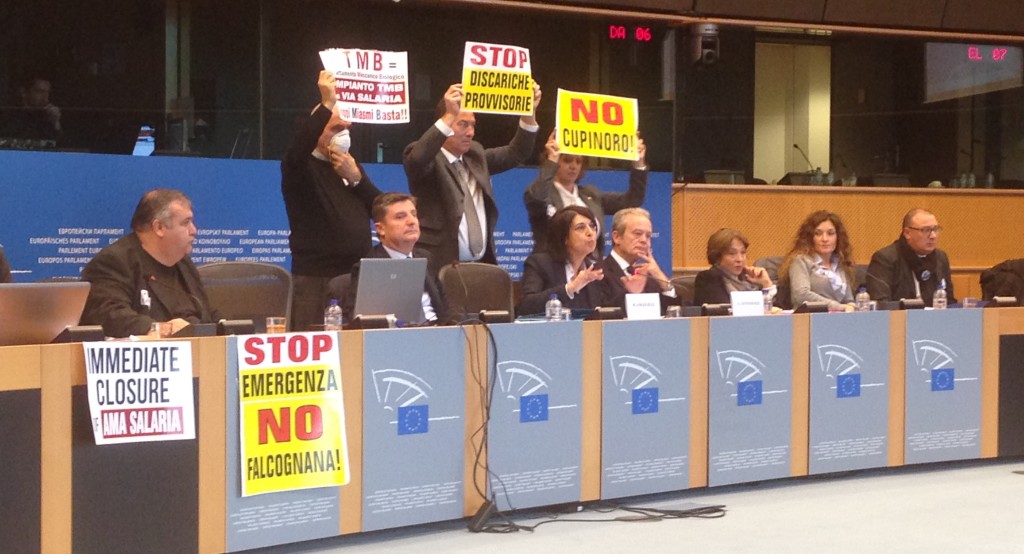During the Petitions Committee, citizens Representatives wore masks and stink bombs
Angelilli and Antoniozzi (PPE): “Let Commissioner Potocnik come to Italy and see”
They have loads of documents, maps, posters, masks, and even stink bombs to try and make Brussels understand what Roman citizens live with every day. Local administrators and committees from the capital have reported the waste emergency in Lazio to the European Parliament during a hearing of the Petitions Committee. For the umpteenth time, for a problem – far from new, but now, if possible, even more difficult after the closure of the Malagrotta landfill.
At the center of the hearing were the particular cases of the provisional landfill Falcognana, Cupinoro and AMA’s plant in Via Salaria in Rome. Roberta Angelilli, Vice-President of the European Parliament and MEP Alfredo Antoniozzi, supported the citizens’ demands. Angelilli says Falcognana recently relocated to landfills concerned because “there are landscape constraints,” while Cupinoro is the “Malagrotta of the poor, since things there are still as is.” Regarding Via Salaria, however, the citizens explain relocation is sought because, “it is three meters from structures where hundreds of people work and 50 meters from the citizens’ homes,” who are forced to live with every day unbearable stench. Attempting to give one an idea, committee members broke a smelly vial in the chamber during the commission.
“Malagrotta should have taught us something but obviously it didn’t. In the months leading up to and following the closure of the largest landfill in Europe – announced Angelilli and Antoniozzi – a new policy was not put into place for waste management, no efficient and modern plan looking out for the environment and citizens’ health safety.” So, the MEPs demand, it is time to say enough to “temporary landfills” and an “ongoing emergency waste management.”
They declare that Europe is not without its faults too. In Brussels the theme is well-known, given that Italy has already been referred to the European Court of Justice for breach of EU rules on waste. Yet the Commission does not intervene except to penalize for new violations. “The answer – complains Antoniozzi – cannot be: commit the crime and then we will intervene. Like this we’re just crying over spilled milk. For example Falcognana is the story of a disclosed infringement.” If Europe really wants to help Italy, agrees Angelilli, “they must accompany and support them in this process of change in waste management.”
For this reason, the deputies announced their intention to invite the European Commissioner for the Environment, Janez Potocnik, to visit Lazio as soon as possible to “verify the situation himself.” Angelilli says now the Commission must “make a move because the worst thing is this paralysis.” Until today in Rome, continues the Euro MEP, “non-recyclable waste is blocked, a final site has not been identified, they choose makeshift sites without permission, and citizens are in the dark about everything: the situation is about to explode and no one wants it to explode.”
Letizia Pascale






![Un motoscafo in Svezia. Nell'Ue si pone un problema di mancato riconoscimento delle patenti nautiche [foto:
Matti Blume, Wikipedia Commons. Copyright: Creative Commons Attribution-Share Alike]](https://www.eunews.it/wp-content/uploads/2024/11/motoscafo-Saltsjoen_Stockholm_P1090679-350x250.jpg)




